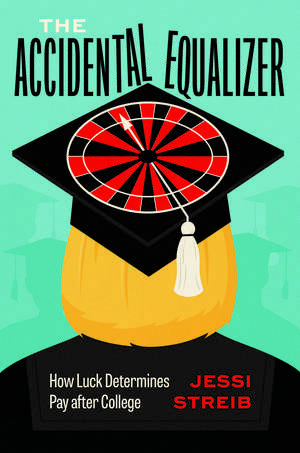The Accidental Equalizer: How Luck Determines Pay after College
Autor Jessi Streiben Limba Engleză Hardback – 16 noi 2023
As a gateway to economic opportunity, a college degree is viewed by many as America’s great equalizer. And it’s true: wealthier, more connected, and seemingly better-qualified students earn exactly the same pay as their less privileged peers. Yet, the reasons why may have little to do with bootstraps or self-improvement—it might just be dumb luck. That’s what sociologist Jessi Streib proposes in The Accidental Equalizer, a conclusion she reaches after interviewing dozens of hiring agents and job-seeking graduates.
Streib finds that luck shapes the hiring process from start to finish in a way that limits class privilege in the job market. Employers hide information about how to get ahead and force students to guess which jobs pay the most and how best to obtain them. Without clear routes to success, graduates from all class backgrounds face the same odds at high pay. The Accidental Equalizer is a frank appraisal of how this “luckocracy” works and its implications for the future of higher education and the middle class. Although this system is far from eliminating American inequality, Streib shows that it may just be the best opportunity structure we have—for better and for worse.
Preț: 152.09 lei
Nou
Puncte Express: 228
Preț estimativ în valută:
29.11€ • 29.100$ • 24.58£
29.11€ • 29.100$ • 24.58£
Carte disponibilă
Livrare economică 10-24 februarie
Livrare express 25-31 ianuarie pentru 34.28 lei
Preluare comenzi: 021 569.72.76
Specificații
ISBN-13: 9780226829319
ISBN-10: 0226829316
Pagini: 256
Ilustrații: 3 tables
Dimensiuni: 152 x 229 x 23 mm
Greutate: 0.48 kg
Ediția:First Edition
Editura: University of Chicago Press
Colecția University of Chicago Press
ISBN-10: 0226829316
Pagini: 256
Ilustrații: 3 tables
Dimensiuni: 152 x 229 x 23 mm
Greutate: 0.48 kg
Ediția:First Edition
Editura: University of Chicago Press
Colecția University of Chicago Press
Notă biografică
Jessi Streib is associate professor of sociology at Duke University. She is the author of two books, including Privilege Lost: Who Leaves the Upper-Middle-Class and How They Fall.
Cuprins
One: Introducing the Luckocracy
Part I: Forming the Luckocracy
Two: Hidden Information on Jobs and Pay
Three: Hidden Information on Class-Neutral Hiring Criteria
Part II: Playing the Game
Four: Preparing for the Luckocracy
Five: Searching for Jobs
Part III: The Consequences and Continuation of the Luckocracy
Six: The Consequences of the Luckocracy
Seven: The Luckocracy, Redux
Eight: Should We Keep America’s Best Equalizing System?
Acknowledgments
Appendix A: Theoretical Contribution
Appendix B: Data and Methods
Appendix C: Interview Guides and Questionnaires
Notes
References
Index
Part I: Forming the Luckocracy
Two: Hidden Information on Jobs and Pay
Three: Hidden Information on Class-Neutral Hiring Criteria
Part II: Playing the Game
Four: Preparing for the Luckocracy
Five: Searching for Jobs
Part III: The Consequences and Continuation of the Luckocracy
Six: The Consequences of the Luckocracy
Seven: The Luckocracy, Redux
Eight: Should We Keep America’s Best Equalizing System?
Acknowledgments
Appendix A: Theoretical Contribution
Appendix B: Data and Methods
Appendix C: Interview Guides and Questionnaires
Notes
References
Index
Recenzii
"Based on hundreds of interviews with business school graduates and the employers that subsequently hired them, Streib’s book ultimately argues that college is not, in itself, the great equalizer; the impossible-to-navigate job market is."
“[Streib] examines an important segment of the labor market that gets relatively little attention: entry-level positions for midtier jobs . . . Far too much energy and ink are spent on who gets the most elite jobs, who goes to the most elite schools and how terribly unfair the whole process is. Little of that conversation describes the reality for most Americans. The role of the good-but-not-elite college affects far more people and gives us much more insight into the state of economic mobility than Ivy League statistics.”
“One of the biggest myths out there is that the job market, unlike other spheres of life, rewards merit. But it largely rewards luck. Most employers in large mid-tier markets are not seeking excellence. They just want reliable people who can do the job. And that is, in many ways, a good thing, argues sociologist Jessi Streib.”
"A thought-provoking exploration of how various factors (often beyond one’s control) influence career trajectories and financial outcomes. . . An insightful analysis of the role of luck in career outcomes."
"The book is packed with sociological thinking rather than sociological theories and concepts. It is well written and should provide undergraduates with many insights about all career phases, from the job search to the separation. Undergraduates will have many of their assumptions challenged, especially that inequalities at work may not be based on connections, skills, information, or knowledge, but on luck. 'Luckocracy' may be difficult to face. However, Streib makes a compelling argument that luck plays a larger role in decision-making than students have been taught to believe."
“That working-class students from state universities do just as well in the job market as better-off students is a remarkable outcome. Even more surprising is that the equalization is actually driven by hiring practices that are so opaque that the graduates are basically flipping coins trying to get hired. Streib’s findings are enormously important for the 80% of all college students who attend those universities and the rocky start it gives their career.”
“Do children born into rich families always make more money than their less privileged counterparts? No! Streib shows that the market for college graduates is a booming-buzzing confusion of idiosyncratic standards, misinformation, and rushed decision-making—all of which undermine the iron law that ‘class matters.’ A striking demonstration that illicit advantage can be countered, provided that one’s willing to infuse the market with lots of noise, luck, and chaos.”
“We now know that a college education can limit inequalities related to class origin, but very few scholars have tried to explain why. Streib’s engaging, provocative account seeks to answer this question. Rare is the book that challenges well-established beliefs shared by academics and policymakers. This one delivers.”
